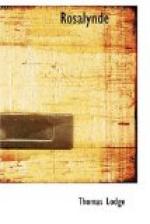[Footnote 1: Seccombe and Allen, “The Age of Shakespeare,” Vol. I, p. 119.]
Scarcely less significant are the changes that Shakespeare made in the characteristics of the dramatis personae. The motive of the elder brother in mistreating the younger he makes envy, not avarice as in the romance, a substitution due to his desire to unify the action by drawing a parallel between the brothers and the dukes. The superiority of Shakespeare’s Rosalind to Lodge’s delineation of the character has, perhaps, been slightly overestimated. To describe Lodge’s Rosalynde as “a colorless being, incapable of entering into the spirit of her part"[1] is really too severe a condemnation. Of course Lodge’s heroine does lack the exquisite charm of saucy playfulness coupled with gentle womanliness that makes Shakespeare’s Rosalind perhaps the most popular heroine of English comedy. Yet Lodge furnished to Shakespeare far more than a name for his heroine. In the dialogue between Ganymede (Rosalynde) and Aliena there is a good deal of lively banter that must have furnished more than a suggestion for the teasing playfulness of Rosalind in the play. Such, for example, is the conversation between the two girls upon finding a love poem “carved on a pine tree."[2] As in the drama, Rosalynde’s wit is always sharpened by the presence of her lover. Often her tone of raillery is noticeably similar to that of Shakespeare’s heroine.[3]
[Footnote 1: W.G. Stone, Transactions of the New Shakspere Society, 1880-1886, pp. 277-293.]
[Footnote 2: P. 29. Compare the speech of Ganymede (Rosalynde) with Rosalind’s speech in “As You Like It,” III, ii, 367-381.]
[Footnote 3: Compare “Rosalynde,” pp. 63-64, with “As You Like It,” IV, i, 80-93.]
Upon a careful study of “Rosalynde” one cannot avoid the conviction that in selecting it as the basis for “As You Like It” Shakespeare displayed a sound judgment. Not only is it a good story of its kind, but it lends itself readily to dramatic adaptation. In adapting it Shakespeare made of it something quite different and incalculably more valuable than the romance. Yet “Rosalynde” is still in its way charming, and an appreciation of its charm may, instead of lessening our reverence for Shakespeare’s genius, really increase it by leading us to see as he did the freshness and beauty as well as the dramatic possibilities of the story.




